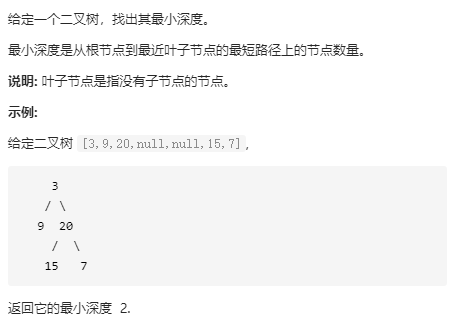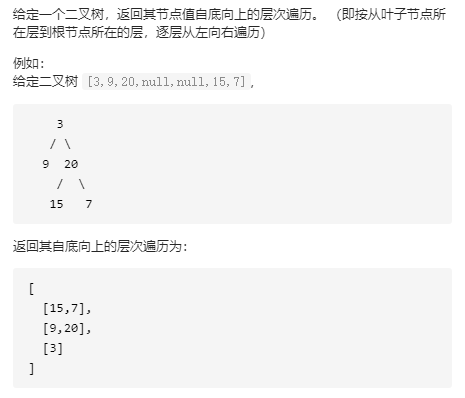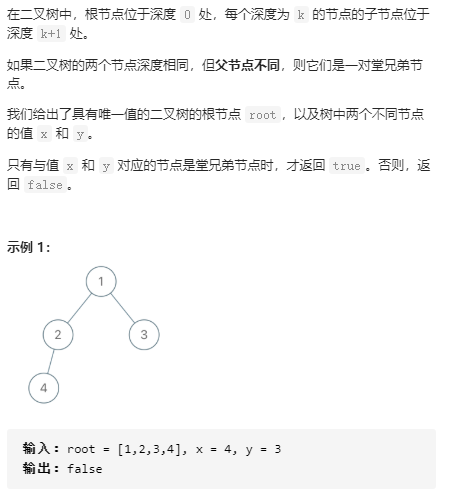广度优先搜索
广度优先搜索算法(英语:Breadth-First Search,缩写为BFS),是一种图形搜索算法。简单的说,BFS是从根节点开始,沿着树的宽度遍历树的节点。如果所有节点均被访问,则算法中止。 ——维基百科。
实际应用
对比
深度优先搜索
深度优先搜索用栈(stack)来实现,整个过程可以想象成一个倒立的树形:
1、把根节点压入栈中。
2、每次从栈中弹出一个元素,搜索所有在它下一级的元素,把这些元素压入栈中。并把这个元素记为它下一级元素的前驱。
3、找到所要找的元素时结束程序。
4、如果遍历整个树还没有找到,结束程序。
广度优先搜索
广度优先搜索使用队列(queue)来实现,整个过程也可以看做一个倒立的树形:
1、把根节点放到队列的末尾。
2、每次从队列的头部取出一个元素,查看这个元素所有的下一级元素,把它们放到队列的末尾。并把这个元素记为它下一级元素的前驱。
3、找到所要找的元素时结束程序。
4、如果遍历整个树还没有找到,结束程序。
具体例子
1. 二叉树最小深度(LeetCode-111)

解法:
var minDepth = function(root) {if (!root) return 0const stack = []// 把root节点压入stack中stack.push([root, 1])let depth = 0while (stack.length) {// 取出首位const current = stack.shift()const currentRoot = current[0]depth = current[1]// 如果当前节点没有下一级了,则为最短路径if (!currentRoot.left && !currentRoot.right) breakif (currentRoot.left) stack.push([currentRoot.left, depth + 1])if (currentRoot.right) stack.push([currentRoot.right, depth + 1])}return depth};
2. 二叉树的层次遍历2(LeetCode-107)

解法:
var levelOrderBottom = function(root) {if(!root) return []const stack = []// 结果数组const ans = []// 当前深度let depth = 0stack.push([root, 1])while (stack.length) {const current = stack.shift()const currentRoot = current[0]// 如果迭代深度比当前深度大则新增一个数组if (current[1] > depth) {ans.unshift([currentRoot.val])depth = current[1]} else {ans[0].push(currentRoot.val)}if (currentRoot.left) stack.push([currentRoot.left, depth + 1])if (currentRoot.right) stack.push([currentRoot.right, depth + 1])}return ans};
3. 二叉树的堂兄弟(LeetCode-993)

解法:
var isCousins = function(root, x, y) {if (!root) return trueconst stack = []let activeTree = null, activeDep = 0, ans = truestack.push([root, 1, null])while (stack.length) {const current = stack.shift()const currentRoot = current[0]// 如果不在同一层次 直接返回falseif (activeDep && current[1] > activeDep) {ans = falsebreak}// 匹配节点时if (currentRoot.val === x || currentRoot.val === y) {// 第一次匹配进行赋值保存if (!activeDep) {activeDep = current[1]activeTree = current[2]} else {// 第二次匹配如果深度不同或者父节点相同 直接返回falsif (activeDep !== current[1] || activeTree === current[2] ) {ans = false}break}}if (currentRoot.left) stack.push([currentRoot.left, current[1] + 1 , currentRoot])if (currentRoot.right) stack.push([currentRoot.right, current[1] + 1 , currentRoot])}return ans};

